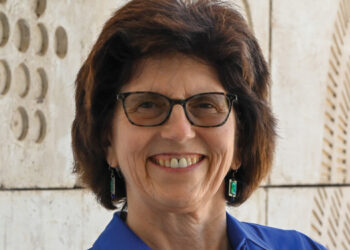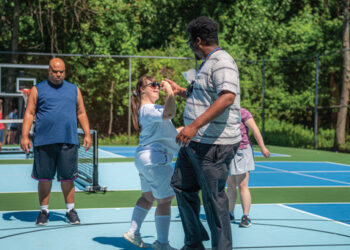Facilities are redefining wellness through counseling, mindfulness and member-driven support focused on mental health.
Community rec centers have long focused on improving physical health through cardio, strength training, aquatics and more. But in recent years, there’s been a growing recognition that wellness must include the mind and spirit — not just the body.
That recognition has evolved into a movement to meet the rising demand for mental health support and holistic wellness for many community rec centers across the country — including the YMCA of Greater San Antonio.
Celebrating 150 years in 2026, the YMCA of Greater San Antonio has long adapted to community needs. Kristine Gusman, the associate director of counseling and well-being, said the organization’s mental health services are now central to its mission.
“Prior to 2020, mental health wasn’t discussed in relation to holistic health,” said Gusman. “Now we all understand that mental health, spiritual health and physical health are all equally important to your overall health.”
That understanding was sparked by the early days of the COVID-19 pandemic. At first, the Y focused on education — training staff and teaching members about mental wellness. But within a few months, Gusman said it was clear that education alone wasn’t enough.
When they noticed members struggling with isolation and rising mental health concerns, it became apparent the community — especially seniors and youth — needed direct, affordable services.
With support from the City of San Antonio’s COVID-19 relief funds, the Y was able to launch a community counseling program directly inside its facilities. The practical and strategic program helped break down three main barriers to mental health care: accessibility, stigma and affordability.
Today, the YMCA of Greater San Antonio offers counseling services at eight locations, with plans to expand in the future. Members and non-members alike can access individual, group and family counseling, educational workshops and holistic health programs — from Pilates to diabetes prevention courses. With scholarships and grants available, the Y strives to ensure that financial difficulties never block someone from care.
“Members and community members see their overall health improved as well as their relationships, self-confidence and quality of life,” said Gusman. “They begin to discover they need to practice self-care in all aspects of health before caring for others.”
The Y works primarily with in-house staff to provide services, relying on professionals trained in clinical work and community engagement. For more specialized care, they maintain a strong network of local partners — including NAMI San Antonio and San Antonio Behavioral Health.
“The Y has had the opportunity to bring accessible and affordable mental health services to our community because of the partnerships,” said Gusman. “Being open to collaborations is important to expanding services outside of our programs.”
Those partnerships — along with funders, health providers and city agencies — have been key to sustaining and expanding their efforts. They’ve collaborated with the Humana Foundation, Community First and United Way to help offer low-cost services to those who need financial assistance.
Along with collaborations, Gusman advises other community rec centers to keep it simple and not try to do it all. “Don’t try to be everything to everyone,” she said. “But see the need in the communities you service and find ways to fill gaps or connect them to outside resources.”
The Louisville JCC has also embraced this community rec shift — not just through therapy, but through thoughtful, accessible wellness programming focused on mental and emotional health.
“If we don’t address mental wellness, then we’re not really addressing our members’ full-body health and wellness,” said Susan Kwasny, the director of health and wellness at the Louisville JCC.
Offering programming that helps members slow down and reconnect with themselves is one way the JCC is leaning into mental wellness. This includes a variety of yoga classes — from chair yoga to power yoga — and meditation workshops, which Kwasny said have been particularly effective.
More recently, they’ve started offering sound baths that also received positive feedback from members. Meditation classes and sound baths offer members an opportunity to unwind from electronics and disconnect from the noise of TVs and phones — lowering stress levels and encouraging self-care all at once.
The success of these programs comes down to intention and expertise. Like the San Antonio Y, the JCC uses their staff to offer mental health services but ensure high-quality training. Every instructor is required to meet a high bar for certification and align with the JCC’s mission: ensuring every member finds the service that benefits them the most.
When it comes to implementing and improving community rec mental health services, being open to hearing member feedback is vital.
Comment cards and direct feedback help shape programming at the JCC and keep it aligned with what the community needs. Negative feedback tells them what they need to change quickly and positive feedback helps them know they’re on the right track. It also helps evaluate instructors, ensuring the classes are fulfilling what members want.
“If we get feedback about a certain instructor who is really helping the members, we make sure they can take on more classes and expand their role here,” said Kwasny.
The YMCA of Greater Antonio also values member feedback. They ensure individuals reach their personal goals through evaluations of programs and services. It was through listening to members they were able to see the need for mental health services within their organization.
For community rec professionals, the message is clear: supporting member’s mental health is essential.
Whether through counseling and partnerships like the YMCA of Greater San Antonio or intentional wellness programming like the Louisville JCC, community rec centers are in a unique position to serve their members. They’re trusted institutions already seen as spaces for health, community and connection.
Community rec centers can also be more approachable than clinical settings. Since the Y has so many offerings, Gusman noted how people don’t have to share they’re going specifically for counseling. There’s no shame in just going to the gym, which can help lead people to deeper healing through wellness programs.
Overall, the YMCA of Greater San Antonio and the Louisville JCC give community rec centers accessible and tangible ways to help break the stigma surrounding mental health for members. Listen to your members, build relationships with the community and above all, open the doors for members to feel comfortable getting the help they need.










